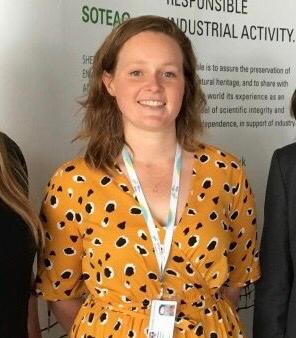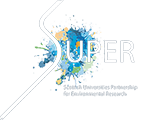
Izzy Langley, a postgraduate researcher from the first SUPER DTP cohort, undertook a 3-month internship in 2023 with SMRU Consulting, an environmental consultancy specialising in marine mammal science. The internship was with the Offshore Wind Team and was arranged by Izzy herself reaching out to the Science Director, Dr Cormac Booth. After finishing her PhD, Izzy was employed by SMRU.
Izzy shares her reflections on the experience below.
What reasons did you have for undertaking an internship?
I was interested in undertaking an internship to gain more experience in the applied side of marine mammal science. As I come to the end of my PhD, and am considering different career paths to take, I wanted to learn more about environmental consultancy, and thought that an internship could provide a great overview of what the field involves. I thought it was an excellent opportunity to meet people currently working in consulting and broaden my network beyond the academic field. The timing also worked to provide a wider, more applied context within which to frame my own PhD research when writing up my thesis later in the year.
What did your internship role involve?
My internship role in the offshore wind team involved shadowing Principal and Senior Scientists in pre- and post-construction project work and client meetings, assisting in the information gathering for future Environmental Impact Assessments, contributing to knowledge exchange workshops across the international staff team, and building an offshore wind impacts repository to aid the writing of future impact assessment chapters.
The meetings I attended included operations logistics and piling strategies with developers of OWF projects in development in UK and Irish waters. I also attended project meetings in the baseline and monitoring phases of OWF developments. This included the Crown Estate funded PrePARED project (Predators and Prey Around Renewable Energy Developments) and the IDEAS project (Improving Density Estimation from Digital Aerial Surveys), a post-consent monitoring project for an English wind farm.
Over the 12 weeks I took the lead on my own project which was to undertake a review of the latest scientific literature investigating the impacts of offshore windfarm developments on marine mammals. This involved summarising individual studies, reviewing the experimental design, and extracting the noise thresholds and disturbance ranges from the results. The aim of this work was to streamline the writing of environmental impact assessments, where information could be quickly filtered by species (e.g. harbour porpoise), region (e.g. North Sea), and impact (e.g. piling noise).
What were the main benefits to you of undertaking the internship?
The main benefits to me undertaking the internship with SMRU Consulting was to learn what the field of marine environmental consultancy entailed, broaden my experience within applied science, be able to better frame my own research in a more applied context, and extend my network of potential collaborators both inside and outside of academia and marine mammal consultancy. To meet net zero targets by 2045, offshore wind farm developments will continue to increase in the waters of north-west Europe. Understanding and minimising the impacts these have on marine mammals is therefore increasingly relevant and will evolve as emerging technologies are developed.
What opportunities for skills and personal development did the internship offer?
As part of the internship, I undertook formal and informal training courses. This included the Offshore Wind Industry Council’s Pathways to Growth which provided me with a baseline understanding into offshore wind in the UK, key players in the industry, the role of legislation and policies underpinning developments, and the requirements at each stage from the initial conception through to monitoring post-construction. I also got to audit an Unmanned Aerial Vehicle (UAV) Certificate of Competency training course, as part of the IDEAS project. This Civil Aviation Authority approved training outlines the rules and regulations behind the recreational use of UAVs in the UK. The course includes background information into the legal side of air space, flight performance, operating principles, planning, and the UK low flying system and collision effects.
During the three months I also benefitted from informal training and got to learn more about broader professional skills such as project management, allocating staff time, report writing, quality assurance and quality checking, team meetings, and skills share. SMRU Consulting is a very collaborative team and hold weekly meetings to update one another on projects worked on and skills acquired across the three international offices. Being part of these meetings was helpful both in learning new skills and also identifying my own skillset which could benefit other projects.
What were the main achievements and outcomes of the internship?
The piece of work that I led on has been well received by the team, and I learnt a lot putting the resource together. More generally, I think it is difficult to quantify the outcomes from this internship as it has mainly been the experience and insight into the work undertaken by SMRU Consulting, and consultancy generally that I consider an achievement. I knew very little about how much science was undertaken, and the freedom projects have to address interesting questions. I also consider it an achievement to have identified environmental consultancy as an interesting career option for me beyond the PhD, either immediately or at some point further down the line.
Would you recommend an internship to other PGRs?
I would very much recommend doing an internship during a PhD. For me, it provided me with more confidence in a potential career path which I previously knew very little about. I think it also has given me a range of transferable skills, both directly and indirectly related to research. And potentially most importantly, I met lots of kind and supportive scientists working in applied research who I will endeavour to stay connected with throughout my career.
